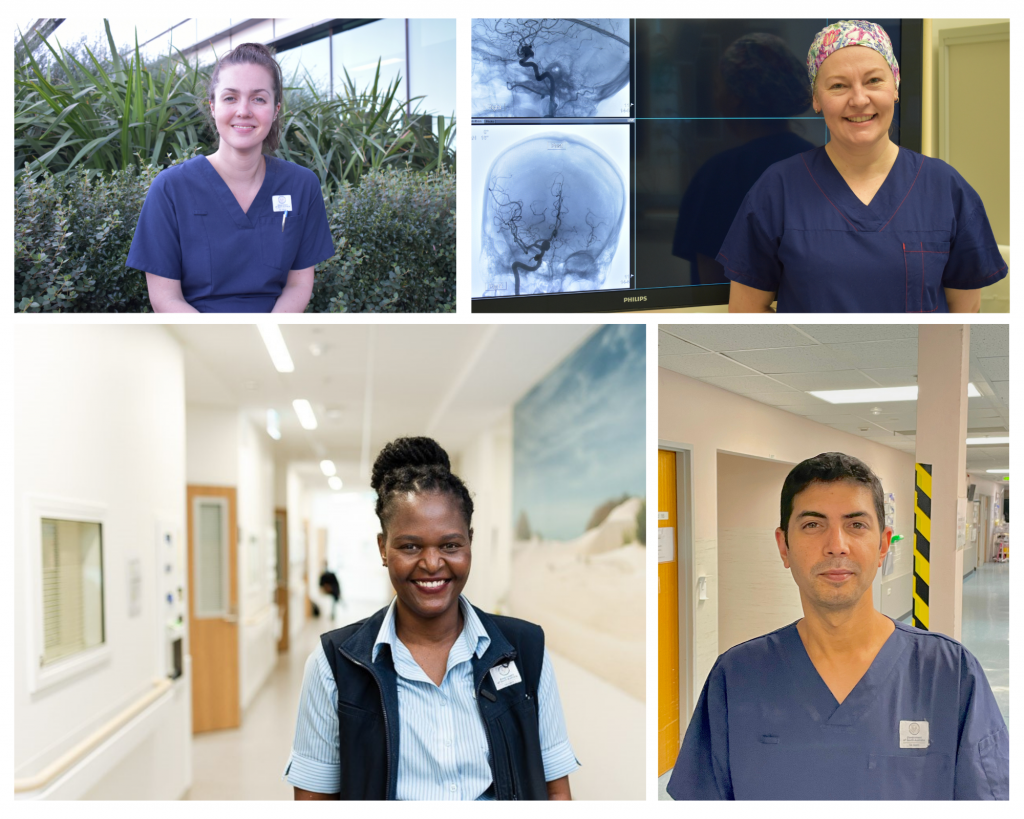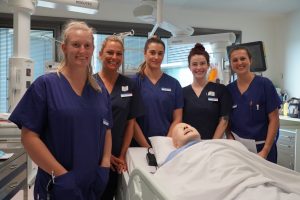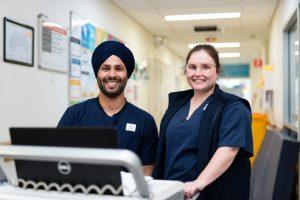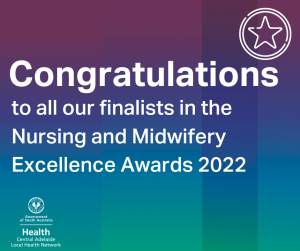This International Nurses Day, Central Adelaide Local Health Network (CALHN) is highlighting the enormous contribution of our dedicated and highly skilled nursing staff and honouring their significant influence in the health journey of our consumers, their families, and carers.
Celebrated around the world every year on May 12, International Nurses Day is also an opportunity to acknowledge nurses’ professionalism and commitment to improving the health of our community.
With nurses comprising around 52% of CALHN’s workforce, our nurses make an immense impact across our network every day in a diverse range of roles and areas including:
- Surgery
- Medical and Geriatric Medicine
- Intensive Care
- Palliative Care
- Mental Health
- Medical Imaging
- Pathology
- Refugee Health
- Hospital in the Home program
- Brain Injury and Rehabilitation
- Vascular
- Heart and Lung
- Haematology/Oncology
- Outpatients
- Research
- Education
As part of CALHN’s celebrations, we asked some of our wonderful nurses to describe their personal approach to patient care:
Daisy (Heart and Lung)
“Every day I come to work with the intention of creating positive change. I genuinely love my job, so it’s never really “work”.
I strive to ensure that my patient’s day is better because of me being there, and positively impact their care during their hospital journey. Patient-centred care is always my priority.
I share knowledge with my peers and aim to nurture junior nurses, supporting their professional growth in a demanding career that will undoubtably be one of the most rewarding adventures of their life.”
Romi (Rehabilitation services)
I actively communicate and listen to my patients, then I can provide patient-centred care to meet their needs and requirements.
I give my patients emotional support and encourage them to regain their independence as much as I can.
I am a helpful and enthusiastic person and love to give a hand to other nurses during my work. I believe this creates a friendly working environment in our ward. I also communicate well with nurses and a multi-disciplinary team to always make sure my patients are safe.
Erika (Vascular)
“I am very proud to have helped develop the role of Amputee Support nurse and Prehab at CALHN, which aims to improve the experience and outcome for patients who undergo a major limb amputation. These programs allow CALHN to care for amputees compassionately and to smooth out the inevitable “bumps” on their pathway. We provide pre-operative counselling and support, assisting them as they consider their chosen treatment. This includes how a major limb amputation impacts a patient’s way of life, including physically, mentally and socially.
I’ve nurtured strong and rewarding relationships with our allied team, external network and amputees, and I feel I make a difference in their journey and to people’s lives while they are here with us.”
Ketra (Orthopaedic Surgery)
“I have a passion for evidence-based practice and quality patient-centred care, through supporting and leading initiatives that improve patient safety. These include quality improvement, environmental safety, risk management, research and education that deliver better outcomes.
I am proud to have led a very hardworking and resilient orthopaedic team throughout the recent accreditation survey. The team embraced their roles and responsibilities in service delivery and evaluation of quality care, proudly showcasing their amazing work and our contribution to CALHN.
Partnering with consumers at every level of their care is our priority as a team and I am proud that our work in orthopaedics has been celebrated through consumer feedback which in turn boosts our team morale.”
Cathy (Outpatients)
“I believe in what I call ‘holistic nursing’. Not just assessing, for example, a wound on it’s own or checking someone’s blood glucose level, to me, it’s about looking at the patient as a whole person. It’s about working as a team member and collaborating a plan of care with the multidisciplinary team, not just in the hospital but also the community to optimise the best outcome for the patient. It’s about being a patient advocate to optimise healing and wellbeing, both physically and psychologically. I love the diversity of Outpatients, so many different clinics to gain and improve knowledge and skills. So many different personalities, health issues, healing and wellbeing pathways. I love working with people in health care (other than Nursing) and allied health disciplines.
We all have so much to offer the patient in need and together we can help prevent outpatients from becoming inpatients.
I also love the rapport that can be made with patients and their families who either need more regular visits to our clinics for healthcare or who we have helped resolve their health issue so that they can be discharged back to the care of their GP. I feel so lucky to have chosen the right career for me from a young age. I wouldn’t want to do anything else.”
Carissa (Haematology/Oncology)
“As a clinical nurse within the cancer directorate, I provide holistic patient-centred care to those in a vulnerable and challenging period of their life. This care also extends to include loved ones and the wider family circle. Human dignity, dedication, integrity, autonomy, altruism, and patient advocacy are all core focuses of my practice and my contribution to this profession. I provide emotional support and a compassionate/empathetic ear to all those I care for. Establishing a sense of trust and good rapport with all involved improves patient outcomes.
I always try to make my patients day a little brighter even when they are at their lowest – even if that is just doing the simplest of things for them or just being present.
It is a professional privilege to be working within the cancer directorate, knowing within yourself that you and your colleagues have genuinely performed to the highest standard.”
Titus (Mental Health)
“I have had the privilege of working within mental health in Adelaide for over 10 years. I work with a fantastic multi-disciplinary team, and as a nurse I am focused on promoting psychological, emotional, and physical wellbeing.
I am fortunate to be a part of a team of nurses who are passionate about developing a nursing group program focused on non-medical engagement with consumers, taking a “safe wards” philosophy that involves clear communication, knowing each other and positive words to make a calmer, safer and more positive experience for consumers.”
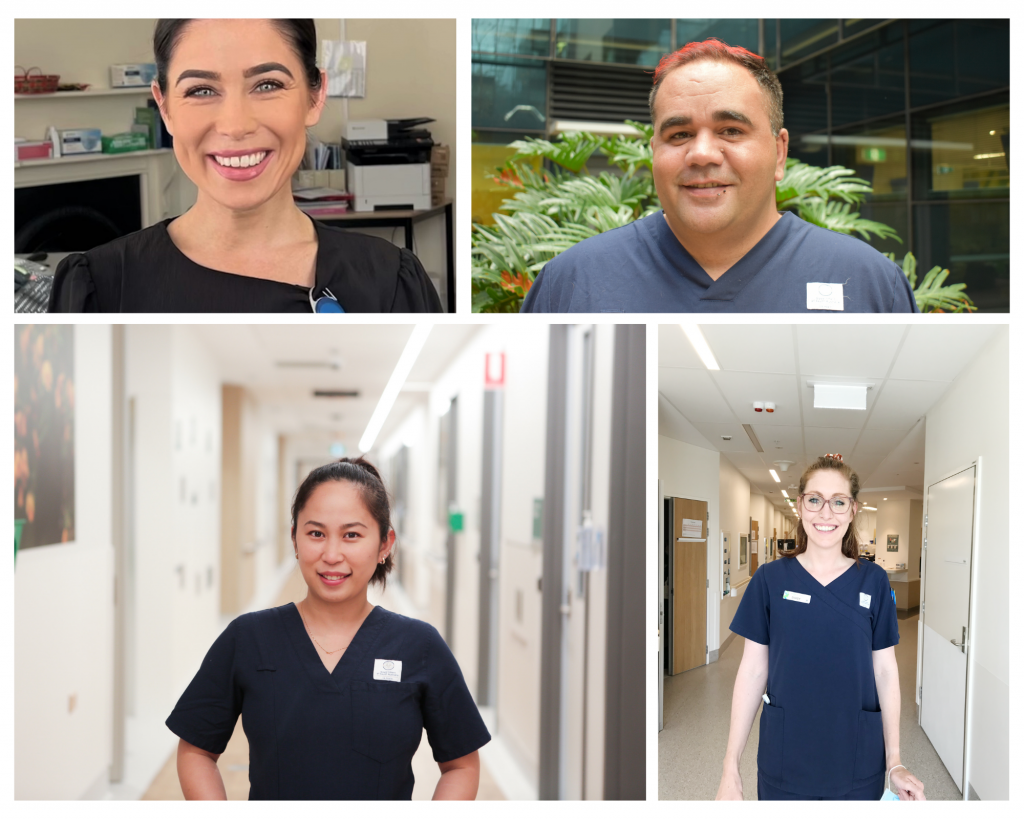
Stacey (Covid Care Clinic)
“I believe my contribution as a registered nurse within CALHN is to assist all patients in their treatment process. I consider it important for all patients to be offered emotional support such as listening to all questions and worries and to answer them to the best of my knowledge.
I am also able to ease the anxiousness that may arise when they come into hospital as a COVID positive patient and to support the patient’s family. I also provide my knowledge and skills as an experienced nurse to our new nurses that join CALHN.”
Peter (Intermediary Care)
“I believe my contribution is assisting in delivering culturally-safe care for Aboriginal and Torres Strait Islander people.
This includes providing direct care to the people of my community, as well as educating my non-Indigenous colleagues about culturally-safe practices.”
Nola (Pregnancy Advisory Centre)
“Nursing at the Pregnancy Advisory Centre (PAC) for the past 16 years has been the most rewarding experience I could have wished for. PAC nurses support women and pregnant people who make an often emotional and sometimes difficult decision to have an abortion.
Domestic and family violence, sexual assault, mental health issues and substance abuse are additional factors that affect some client’s lives and PAC nurses care superbly for all clients with trauma-informed care, kindness and non-judgemental respect. I cannot imagine working anywhere better.”
Erin (Medical imaging)
“I am privileged to lead the SA Medical Imaging interventional radiology nursing team that provides care for patients undergoing various interventional procedures in our angiography Technical Suites and CT Interventions rooms. We are involved in the diagnosis and treatment of a wide range of conditions including cancer, vascular disease, renal, liver, neurological and endocrine problems. We also provide an emergency service for stroke patients, trauma, acute bleeding and some vascular emergencies.
As nurses we can make such a difference for our patients by keeping them in the centre of everything we do.
My contribution is to strive to ensure that our patients always feel safe and supported when they are in our care.”
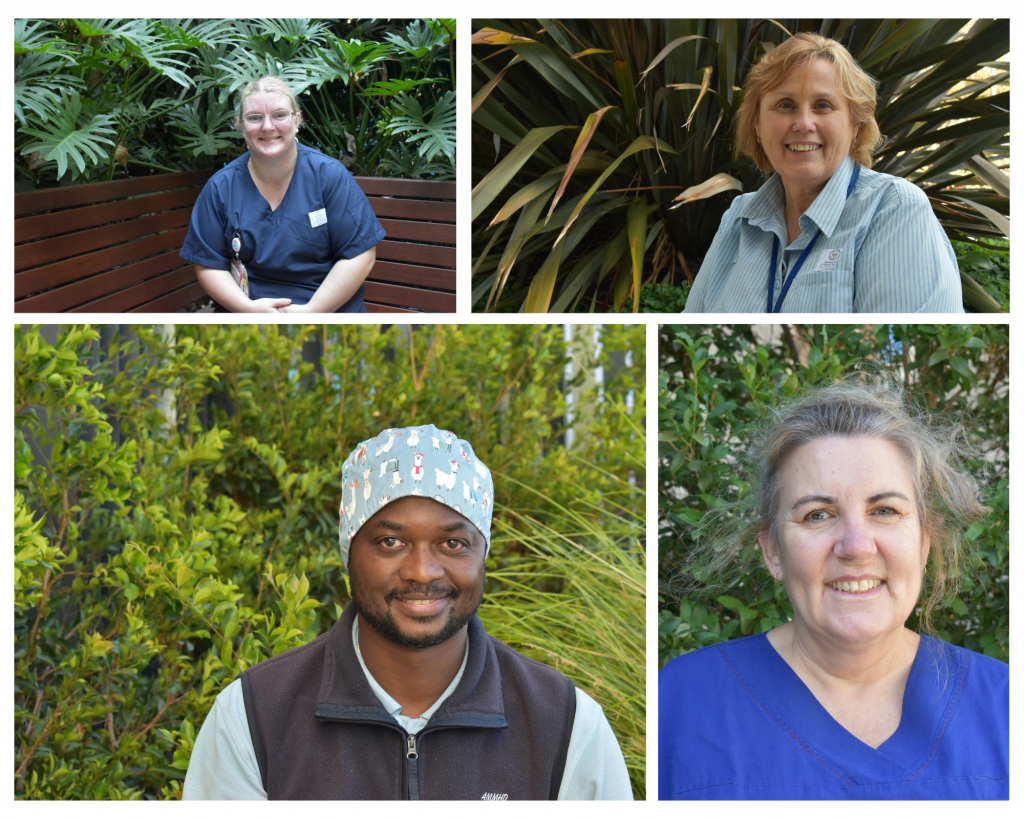
Samantha (Refugee Health)
“My contribution as a nurse in refugee health is a very special one to me. A major part of my role is to support the complex health and wellbeing needs of newly arrived people from a refugee background and their families. I also am an advocate and voice for this vulnerable cohort of people.
I provide care that is culturally-diverse, nurse-led and compassionate and no two days are ever the same.
My nursing care is driven by passion and understanding of why people flee their home countries and making them feel warmly welcomed to their new home. In my role as a refugee health nurse, I am continually inspired by the people I meet, the stories I hear and the kindness I am surrounded by.”
Sophie (Intensive Care)
“The intensive care unit cares for patients when they are at their most vulnerable.
No matter the reason that has brought them to us, we treat them with respect and make sure they are emotionally and physically comfortable. We provide reassurance to help them to feel safe and cared for.”
Marie Joyce (Brain Injury rehabilitation)
“The exceptional and nurturing group of nurses in BIRU have taught me to care for our clients beyond their adversities, guided me through the overwhelming dynamics of behaviour management, and most importantly, the unit and the senior nurses have shaped me to become a nurse that can withstand the emotional and physical demands of the job.
Nurses have an inherent compassion and selfless caring character, but nursing in BIRU made me see another side of nursing. I would like to believe that my care has made an impact and contribution to our clients.
We offer them hope and inspiration; when they scream of frustration, we remind them of their progress and strengths; when they are in denial of their limitations, we assist them to safety; and when they feel low and depressed, we stay by them and remind them of the strengths and progress in their rehabilitation.”
Dikeledi (Hospital in the Home)
“I arrived in Adelaide from South Africa to work as a midwife before moving into vascular nursing and it has been my passion ever since. I have used my skills and knowledge to contribute to education of both nursing and medical fields, including leading the accreditation of staff in the use of doppler studies.
I have worked with Hospital in the Home since 2016 and have been able to consolidate all my nursing skills and learned many new ones.
I love working as a Hospital in the Home nurse because I can contribute to my patient’s holistic care. This allows them to make educated choices and achieve good health outcomes.”
Amilin (Palliative Care)
“I have a passion for palliative care nursing and am immensely happy to be a part of an excellent team. As a nurse in this area, it is gratifying to facilitate sensitive conversations with patients and caregivers and consider their concerns and values in conversations about treatment options and goals. Being present for our patients and their families and using my professional knowledge and clinical skills to manage their symptoms and improve their quality of life is highly rewarding.
Maintaining the dignity of the patient and respecting their values and beliefs is also unbelievably valuable.
I strongly believe in teamwork, where we can share patient and caregivers’ experiences and concerns with other members of the care team and collaboratively work to integrate patient-level information into evidence-based practice.”
